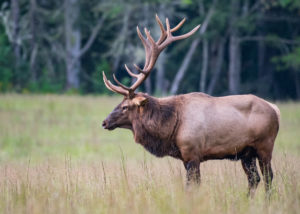Blog
Elk Thrive in Great Smoky Mountains National Park
Visitors to the Great Smoky Mountains National Park look forward to spotting our large wildlife–namely bear and elk. We are fortunate indeed to be located near such splendor.
Did you know that once large numbers of elk freely roamed the Appalachian Mountains and eastern United States? Unfortunately, overhunting and destruction of habitat severely lowered their numbers. Conservation groups became concerned that the animals would eventually become extinct. The last of the magnificent beasts disappeared from Tennessee in the mid 1800’s.
In 2001 the National Park Service reintroduced elk to the Great Smoky Mountains National Park. Twenty-five of the animals were moved to the park then, and 27 more were placed here in 2002. The elk (or wapiti) wear radio collars and ear tags to aid conservationists in tracking their range and movements. The herd now numbers as many as 200 animals.
These are the largest animals in the Smokies. The bulls weigh 600 to 700 pounds, measure 7 to 10 feet long, and sport antlers that can measure 5 feet from tip to tip.
Safe Viewing of Elk in the Park
The best times to view these animals are early in the morning and late in the evening. They also are more active after storms or on cloudy days. Most of them are located in the Cataloochee area in the southeastern section of the park, easily accessible from the Buckhorn Inn. This is a lovely area to hike and picnic as well. Always view these wild animals from a safe distance, using binoculars or a camera for close-ups. Be especially careful of calves as there likely is an anxious mother nearby. The males may perceive you as a challenger and charge. The National Park Service offers a short video about safely viewing elk. You may find a link to it at http://www.nps.gov/grsm/learn/nature/elk.htm
During March and April the animals begin to shed their antlers. Please note that it is not legal to remove antlers from the park. The discarded antlers are a rich source of calcium for other wildlife in the park.





Gatlinburg Weather
Click for weather forecast